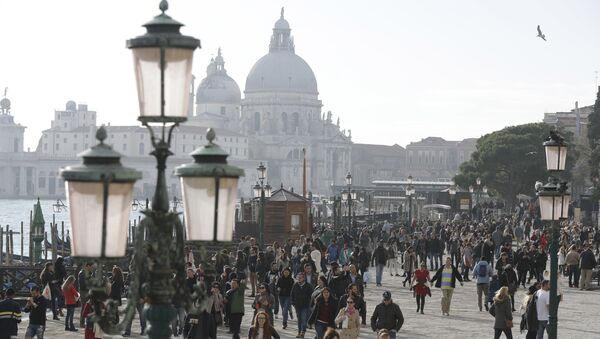Sputnik: What is the impact of overtourism on the environment of sites?
Jonas Hickson: A lot of the impact to the environment comes from the direct impact of increased footfall: the more people you have coming through an area, the more likely there is to be certainly littering, people not leaving it as they find it, whether intentionally or not. But also, you can get a lot of slight erosion: so when people are coming to especially sights like the one you are looking at, next to the coast, people coming through with transport, especially with boats, they can really impact the erosion in the area and really increase the erosion.
Sputnik: How does overtourism affect the life of residents?
Jonas Hickson: There is a positive effect. I'll start by talking about the positive in that tourism can lead to more investment in an area, it can bring in more wealth to people, which is obviously a good thing. And then there's a downside to that: there's certainly a reduction in the quality of life for the residents. They are becoming frustrated, more than understandably, with the amount of people coming through.
A huge impact that mass tourism projects like this is social. The nuisance is what leads to the collapse of the society. I've seen this before in other micro-societies in Thailand, where I did some work: people come to see these little villages, they like to come and talk to people — which is fine up to a point. But when you have so many tourists coming through, people become frustrated, they don't want to talk to every single person that comes through their village, and this can lead to people to want to move away.
READ MORE: Canadian Conservatives Vow to Stop ‘Birth Tourism'
Sputnik: What can be done to contain forms of mass tourism in a way that both the environment and locals are protected?
Jonas Hickson: From what I have seen, sustainable tourism is a bit of a mess, it doesn't really exist. Not to sustain society, to sustain the economics of the people there. I've never seen it work. But, being said that, there are ways to reduce the impact, and I think that a lot of that has to come from the government. This meets another problem: governments will have to curtail companies like Airbnb that want to bring people in, and say ‘no, you can't bring every single person who wants to come.'
The reason why that doesn't work is that we live in a free market, capitalist society, and that is against the ethos of free-market capitalism. The market is there to be exploited, and people and companies want to exploit it. And when governments try to reduce the numbers of people that are coming through, these companies just move away. While that is good in the short term for the small communities, it's not good for the country and that's the point. I think that governments are very, very hesitant to do anything about tourism because they know it's such a big money spinner for them.
Sputnik: If the scale of companies and governments doesn't work, what can people do on a personal level? What can they do on a smaller scale?
Jonas Hickson: What has been done in the past is to educate people, educate tourists who are going around before they get to the site — I think that is very important — on what the site is, how it's delicate, and the ways they can help the situation by not dropping litter, using sustainable transport and all that kind of things. But again — I sound like the voice of doom — but it's so difficult: people litter, they don't mean to listen, they drop things, and this just happens.
And even in sustainable tourism sites, in my experience, where people have broken rules or just not been as careful as they could have been. It's really difficult. Education goes a long way, and having policies in place whereby, if there is environmental damage, then the tab is not picked up by government, it rather is picked up by the companies that brought the people in.
The views expressed in this article are those of the speaker and do not necessarily reflect those of Sputnik.





